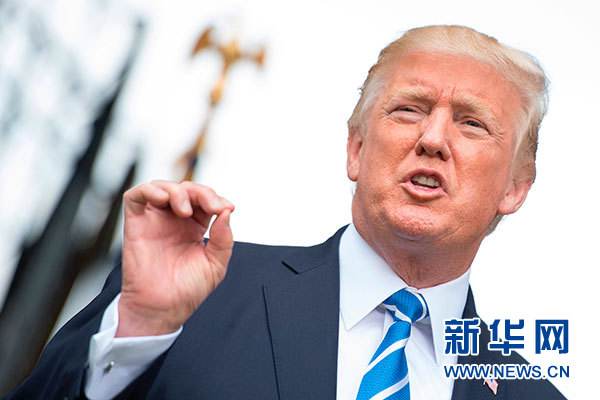The definition of China-US relations can only be friendly
- By Rabi Sankar Bosu
 0 Comment(s)
0 Comment(s) Print
Print E-mail China.org.cn, November 8, 2017
E-mail China.org.cn, November 8, 2017
 |
|
U.S. President Donald Trump [Xinhua] |
American President Donald Trump's first state visit to China from Nov. 8 to 10 as part of his 12-day, five-nation Asia tour is quite significant for what has been called the “most important bilateral relationship” in the world. The aim of the longest presidential tour of Asia in 25 years -- which also includes Japan, South Korea, Vietnam and the Philippines -- is to improve political and economic relations with the region. But Trump’s China visit in particular is a test case for his foreign policy, especially America's East Asia economic and security strategy.
The trip comes at a historic moment, as the just-concluded 19th National Congress of the Communist Party of China (CPC) has laid out a vision for China's foreign policy for years to come. The congress reiterated China’s goals of pursuing development, carrying out an "opening-up" strategy featuring "mutual benefits" and "win-win" results, finding common interests with other countries, and strengthening cooperation with major nations. This background has provided a fortuitous foundation for Trump's visit.
The two presidents already exchanged views on bilateral relations during two meetings earlier this year: at Trump's Mar-a-Lago resort in Florida this April and at the G-20 summit in Germany this July. The informal get-together at Mar-a-Lago highlighted diplomatic and security dialogues, and included conversations on the economy, law enforcement, cybersecurity, and people-to-people exchanges. Since then, the U.S.-China Comprehensive Dialogues exhibited positive chemistry between the two competing nations.
More recently, the relationship under the two presidents has seen a healthy development, with friendly exchanges between top officers and various other communication mechanisms operating smoothly. In the upcoming meeting, it is expected that the two leaders will discuss major international and regional issues of common concern including the denuclearization of the Korean Peninsula as well as trade and investment.
But at the same time, China has denounced so-called "wrongful actions" by the U.S. regarding Taiwan, the Terminal High Altitude Area Defense (THAAD) deployments in South Korea, spying in territories claimed by China, activities by U.S. planes and ships in the South China Sea, and American support of India as having a negative effect on mutual trust and military-to-military ties. Due in part to such spats, China and the U.S. are now seeking to increase mutual trust and practical cooperation as well as jointly tackle international and regional challenges.
Since taking over the Oval Office as the 45th President of the United States, Trump has been critical of China, especially its policy on North Korea. He blames China for failing to mediate and persuade “belligerent” Pyongyang to change course in developing a nuclear-armed ballistic missile capable of attacking the U.S. mainland. But during his meeting with President Xi, he is unlikely to make a breakthrough on North Korea’s nuclear program. Rather, he might consider coaxing China to reach a full consensus on the ongoing deadlock through dialogue and consultation.
For their own sakes, the leaders of the two countries should be careful to properly handle differences over trade and other issues. On Aug. 14, Trump signed an executive memorandum authorizing U.S. Trade Representative Robert Lighthizer to examine China's intellectual property practices, despite worries about potential harms to China-U.S. trade ties. If a trade war were to break out, Chinese countermeasures may prove damaging to the American economy. Trump should be careful to avoid a direct confrontation with the world's second-largest economy, and keep in mind that China could still utilize WTO rules to defend China's national interests.
If Trump really wants to "make America great," he need to focus on trade with China. According to the American Enterprise Institute, the leading recipient of large Chinese investments (excluding bonds) is still the U.S., which "received over $160 billion between January 2005 and June 2017." U.S. exports to China grew by an average of 11 percent over the past decade, much higher than the overall growth of 4 percent in U.S. exports during the same period, according to China's Ministry of Commerce. Building strong trade relations with China may enhance the Trump administration's popularity and legitimacy both at home and abroad, and help realize his campaign promises to make America "rich again," "strong again," and "great again."
There is a Chinese saying, "harmony with differences." International affairs should be harmonious but with an acknowledgement of diversity. China-U.S. relations should be guided by what Xi characterized as "non-conflict, non-confrontation, mutual respect, and win-win cooperation" in what he called "a new type of great power relationship." Surely, the development of China-U.S. ties matters a great deal for the Asia Pacific and the world as a whole.
Rabi Sankar Bosu, Secretary of New Horizon Radio Listeners' Club, West Bengal, India
Opinion articles reflect the views of their authors only, not necessarily those of China.org.cn.






Go to Forum >>0 Comment(s)